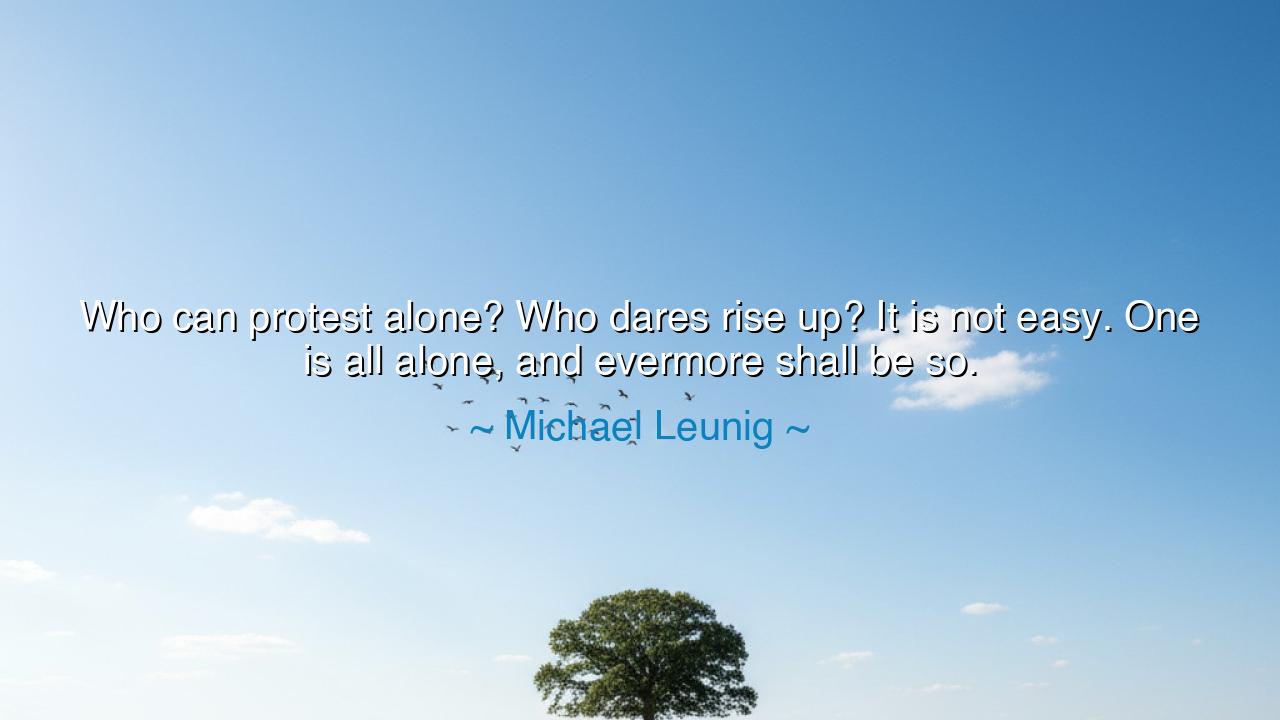
Who can protest alone? Who dares rise up? It is not easy. One is
Who can protest alone? Who dares rise up? It is not easy. One is all alone, and evermore shall be so.






In the quiet yet thunderous words of Michael Leunig, poet, philosopher, and gentle satirist of the human spirit, we find a meditation on the loneliness of courage: “Who can protest alone? Who dares rise up? It is not easy. One is all alone, and evermore shall be so.” These words speak not only to the act of protest, but to the very essence of moral solitude—to the pain and beauty of standing against the tide when all others bow to it. Leunig, a man whose art blends simplicity with profound truth, here captures the eternal struggle of conscience: that to follow truth often means to walk alone.
Michael Leunig, born in Australia in 1945, has long been known for his whimsical yet piercing cartoons and reflections on modern life. Beneath his playful lines lies a heart that sees deeply into the loneliness of the soul in a world drunk on conformity. This quote comes from his meditations on moral courage and human frailty—on the difficulty of being the lone voice of dissent in an age that punishes dissenters. Leunig’s lament is not of despair, but of understanding: he knows that the act of protest—whether against injustice, cruelty, or moral decay—is not simply an act of rebellion, but an act of spiritual endurance. For to protest alone is to risk exile not only from society, but often from one’s own comfort and belonging.
When he asks, “Who dares rise up?” Leunig echoes the question asked by prophets, reformers, and dreamers through the ages. It is a question that trembles at the edge of every age of oppression. To protest is to challenge power, and power never yields quietly. The one who dares to stand, to speak truth against the multitude, faces not applause but isolation. The crowd does not easily forgive those who break its silence. And so, Leunig’s words remind us that courage is not loud, but lonely; that those who walk the path of conscience must often walk it in solitude. The martyr, the prophet, the visionary—all have known this: the price of truth is loneliness, and yet, to remain silent is death of the soul.
History itself bears witness to this sacred loneliness. Consider Socrates, who stood before the judges of Athens and refused to renounce his pursuit of truth. Surrounded by a city that turned against him, he drank the cup of poison with serenity, choosing death over the betrayal of his conscience. Consider Rosa Parks, who, in the quiet of one December evening, refused to surrender her seat on a segregated bus. Alone, she defied a system older and stronger than herself. Her act was small in motion but vast in consequence—it shook the conscience of a nation. Both Socrates and Parks embody Leunig’s truth: to rise up, even in the smallest way, is to embrace solitude; yet in that solitude, one becomes the seed of transformation.
There is a paradox within Leunig’s words that breathes with both sorrow and strength. When he says, “One is all alone, and evermore shall be so,” he acknowledges a truth many fear to face: that moral action, by its nature, separates the individual from the comfort of the crowd. But in this aloneness lies a deeper kind of communion—not with humanity as it is, but with humanity as it could be. For though the protester stands outwardly alone, inwardly he is joined with all who have ever sought justice, truth, and beauty. This is the paradox of righteousness: to be alone in the present is to stand among the eternal.
Leunig’s words also serve as a mirror for our modern age, where silence often masquerades as peace and distraction drowns conviction. In a world that fears controversy, to protest alone—to speak one’s truth with gentleness and resolve—is itself a radical act. Many will choose the comfort of agreement over the pain of authenticity, but the wise know that the soul cannot thrive in compromise. True peace is not the absence of conflict, but the presence of courage. To rise up alone is not arrogance—it is devotion to the greater good, a declaration that the moral voice still lives within the human heart.
The lesson, then, is both heavy and luminous: do not fear the loneliness of truth. If conscience calls you to stand, then stand, even if the world turns its face away. Do not seek strength in numbers, but in integrity. The courage to rise alone is the first step toward awakening others, for every great movement begins with one who refused to yield. And remember this—the loneliness of protest is not eternal, for though you may begin alone, others will hear and follow, drawn by the light of your steadfastness.
So remember, O soul of conscience and courage: though the path of truth may be narrow and solitary, it is the path that leads upward. Michael Leunig’s voice, tender and knowing, whispers across the ages that solitude in righteousness is not emptiness—it is the quiet presence of eternity itself. Walk boldly, then, even when you walk alone, for though the crowd may pass away, the voice of the solitary conscience endures forever, echoing through the heart of humankind like a bell that will not be silenced.






AAdministratorAdministrator
Welcome, honored guests. Please leave a comment, we will respond soon